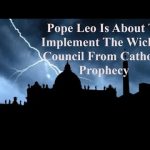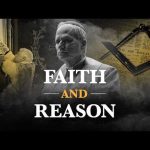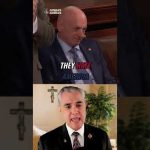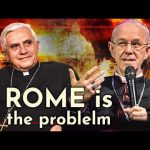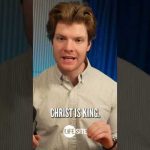By a vote of 240-2, the U.S. bishops voted last Wednesday to write a letter of support to Pope Francis, for an effort to see St. John Henry Newman named a Doctor of the Church.
Bishop Daniel Flores, who heads the USCCB doctrine committee, explained during the bishops’ fall plenary meeting that the Bishops’ Conference of England and Wales had asked the U.S. conference to write a letter in support of their efforts to see Newman given the title.
The bishops’ conferences of Ireland and Scotland are also supporting the effort.
Flores explained that the U.S. bishops’ doctrine committee concluded after a 2019 study that Newman’s writings are “eminent and of great relevance for the Church today” in a variety of areas, including doctrinal development, moral foundations of education, the role of the laity, the search for truth and the primacy of conscience.
“Doctor of the Church” is a title granted by the Church to certain saints whose lives exemplify extraordinary holiness and whose writings or teachings contribute significantly to the life of the Church.
Born in 1801, Newman was a renowned Oxford academic and Anglican theologian. Extensive research on the Church fathers eventually led him to the Catholic Church, which he entered in 1845. He was ordained a priest two years later.
His conversion was not well-received by many of his acquaintances in England. He lost many friends over the decision, including his sister, who never again spoke to him. And his ecclesiastical career was marked by frequent difficulty within the Church.
Still, in 1879, Newman was made a cardinal. He adopted as his motto “Cor ad cor loquitur,” which means “Heart speaks to heart.”
Newman died in 1890. He was 89 years old.
A prolific author, Newman left behind thousands of letters and numerous books and essays, including “Waiting for Christ” and “Meditations on Christian Doctrine.”
He also authored “The Idea of a University,” and today his name is attached to Catholic campus ministry centers on college campuses around the world.
He was beatified by Pope Benedict XVI in 2010, and was canonized in 2019 by Pope Francis. His feast day is October 9.
The Pillar spoke with Bishop Daniel Flores about Newman, his preaching, and his enduring wisdom for the Church.
This interview has been edited for length and clarity.
Why should St. John Henry Newman be a doctor of the Church?
Well, I think first of all, his erudition is unquestioned. His faithfulness to the Church, even in the midst of suffering, at a very difficult time and often with a great deal of misunderstanding.
That suffering only spurred even deeper reflection upon, especially, the ecclesial mystery which he was able to elucidate not only because he was widely read, but also because he had experienced sort of his own personal movement, ecclesially.
For Newman, theology was a movement of life, and I think the depth of his work, and the complexity of it itself, was a sign that there are things which he was able to elucidate by his writing.
That having been said, to be declared a doctor of the Church is a recognition by the Church of one’s importance as a teaching voice in the Church. It’s a high honor, and there’s no guarantee the Holy Father will grant it at this time, and maybe he will only do it later.
But at least for us to have made the request, and we joined with the bishops of England and Wales on that, it was a sign that we perceive that a mark of applicability and of depth is there [in Newman’s work].
It’s a petition to the Holy Father. He may decide it’s an opportune time, or he might not. But this came to us as a request to support a petition, and we supported it.
Newman has been widely translated. He’s read in most all languages.
We’ve heard from many people — I’ve heard from a lot of people, anecdotally, anyways.
But at the same time, I think Cardinal [Daniel] DiNardo made an important point during our discussion about this. Newman’s work does need further study. We need to enter the depth of it even more. And really, no one is named Doctor of the Church because we understand them [completely], and so that they can always be on a pedestal.
The designation is the Church saying this person is trustworthy. But that doesn’t mean that they’re infallible in every one of their opinions or theological positions, but this person is trustworthy, and the Church is invited to enter more deeply into what their teaching is.
So, St. John of the Cross is a Doctor, St. Teresa of Avila as a Doctor, and they have reached a certain level of influence over the life of the Church, but they’re also people we continue to read, to try to understand them still.
So, anyway, I think that no matter what happens to this petition, it’s important that we move the process forward.
I think that because of how much Newman has been studied in the United States, and how influential he has been, and also because he’s not easily pigeonholed into a certain way of thinking, he doesn’t fit our categories.
That is a very good thing for us because we are living in an age which likes to live in its own categories. But Newman kind of bursts that.
His own personal life story is a mirror to what his writing is about. I think it will help us to maybe think outside of our own categories, to think he’s this or he’s that.
I know that’s a long answer to a short question! Anyway, just a long answer to a short question there.
Though it was more than 150 years ago, it seems clear to me that the Church is still aiming to understand the First Vatican Council and its implications, especially with regard to Pastor aeternus, and the pope’s primacy and infallibility.
Newman had reservations about the approach of the First Vatican Council to that issue — even while he ultimately accepted the council’s judgment.
Is there something Newman can contribute to our own efforts to read the First Vatican Council?
Oh, I think he could help us to approach not only the First Vatican Council, but also the theological milieu before the First Vatican Council.
Newman anticipates what will be called in the 20th century, the ressourcement movement, because he’s very interested in the Fathers, as part of his Anglican patrimony. and in understanding them historically — that is, what the controversies were about, or how do there become signs of development, when one thing is accepted and another thing is rejected?
He wasn’t afraid of the messiness of history.
That opens up then after the First Vatican Council, the theological thrust , even after [1879’s] Aeterni patris, which restores Thomism to a certain place — which it hadn’t really held up until that point, especially in philosophical and theological research — which allowed Thomism to go through a ressourcement of its own.
It took a couple of generations, but it returned to the text and it returned to the tradition and understanding it historically.
Etienne Gilson was a great historical theologian, and it would not have been possible for him without Aeterni patris. He was able to look at the historical voice of Thomas in a way it hadn’t been looked at before.
But Newman was doing that too, in the way he was listening to the thundering voice of Cyril of Alexandria, and hearing it in the context of the messiness of history.
So I think in that sense, he opens up some doors that many theologians were able to walk through in the 20th century, leading up to the Second Vatican Council. There’s a wide breadth that he kind of manages there. But he’s also a great poet, and a great prose writer ….which I think is not irrelevant to this. Because how we do our theology is also a matter of the aesthetics of it.
People really couldn’t write nowadays as Newman writes and get away with it. But it has a certain majesty, and it rises to the thematic, put it that way.
Anyway, it would certainly spur us to come out of our categories because he’s not easily categorized: Liberal, conservative, reactionary, traditionalist, and so on.
Newman doesn’t fit those labels. Newman is Newman.
Newman is Newman, which I think is one of the signs of a reliable Doctor of the Church.
Newman is Newman, just like St. Thomas is St. Thomas. Many people came after him and interpreted him in certain ways, and they fight amongst themselves, and still do.
And Augustine is Augustine. Teresa of Avila is Teresa of Avila. Thérèse of Lisieux is Thérèse of Lisieux.
You take them for who they are in the historical context, and they have much to say to us. That’s how I would look at it.
Newman is a highly accomplished theologian, but it doesn’t quite fit to see him as an academic. Rather, Newman is a cleric. He is a preacher. And a correspondent — much of his best theology is in his letters. What does that say to clerics about the relationship between the intellectual life and pastoral life, and the pulpit?
Well, that hearkens back to the Patristic example, because Augustine was much the same: Yes, he wrote the “City of God” and things like that between his sermons. But the bulk of Augustine’s work as a theologian is his preaching: his sermons on the Gospels and in his controversial letters.
That’s the bulk of it, Augustine was as a preacher.
So Newman hearkens back to that — I think it’s a good example for clerics, to say that our theology can faithfully flow out of a deep spirituality of the priestly ministry. It really can.
What guys tell me, of course, is, well, bishop, ‘Who has time to write?’
But I think if you’re going to write a sermon anyway, you at least have something to start with. I think pastoral writing need not be non-theological and theological writing need not be non-pastoral.
I think there’s some bishops who’ve managed to be writers … but a lot of times it’s occasional, I mean, it’s what you’re being asked to talk about, or asked to write about or to do.
Cardinal Francis George comes to mind, in our own time…
Right, exactly. I don’t know how much of his sermons he wrote, but they had that character that we’re talking about. And that’s the sign of a brilliant mind.
I think too of Oscar Romero. We have his sermons because he was recorded on the radio. These sermons, from his cathedral, would go for 45 minutes to an hour, because he knew was addressing an entire country, and all those things have been transcribed.
And when I read Romero’s sermons, I think — ‘There’s a pastoral theologian.’
Because he was applying what was fresh in his mind, the teaching of the Second Vatican Council, which was a memory for him, on the social teaching of the Church. He was constantly referring to Paul VI. He was constantly referring to Gaudium et spes, and then applying that to the situation he was living in.
That’s a pastoral theologian!
At Newman’s canonization, I was moved to see his portrait hung on the front of St. Peter’s Basilica — because in his life, Newman faced trials involving his relationships with the episcopate. So to see him honored in that way was striking.
Do you think the crosses he endured within the Church informed his intellectual life?
I’m sure that they did. For a deep soul, it’s impossible to separate those things out.
Many great saints, especially of the theological type, suffered in their time.
To take an example who is not yet a saint, whose cause is just getting underway, think of Henri de Lubac.
De Lubac had to be quiet for a while, theologically speaking, and he did it, out of love and obedience for the Church. And then, when he was able to begin writing more, he wrote some of the most beautiful expressions of what love and obedience for the Church are even all about. His experience was linked to what kind of theology he was doing.
You know, there are times when the Church has a way of making saints precisely by the crosses she gives them. That is easy to say, but for the saints, it was not easy to live, and still they took it with great love. That’s how you get past the human foibles of the Church.
God is bigger than the decision of this superior, or that superior, in terms of the appropriateness of a decision. And still, obedience. The only thing a superior can’t ask you to do in the traditional theology is, of course, to sin or to break a commandment. But short of that, you accept.
Bishop, today there is in the Church an emerging and developing theology of synodality. What would be Newman’s contribution to the theology of synodality?
Well, here’s one aspect:
With Newman — and in my mind, he gets a lot of this from Augustine — there is an awareness of an intimate sort of relationship between the Christ who preaches, and the Christ who hears, in the Church.
Augustine would, especially his letters on John, talk about that echo. He would always start his sermon by saying, pray for me that the Holy Spirit will allow me to speak the word of Christ and not my own word, that it might find resonance in the Christ in you.
That’s the graceful mystery — It’s kind of a conspiration, and that’s deeply Newman’s, I think, intuition about the reciprocity and mirror-like quality of the way the Church teaches and how the church hears, and that that is infallible.
Now, discerning it in real life is a difficult thing, but that’s what the Church does, that the ear of the body of the Church that hears Christ preach, recognizes the Pastor’s voice.
And the Pastor’s voice manages to break through — through the magisterial office of the Church, despite the fact that that’s an imperfect instrument, but it does have a certain guarantee in it.
So when you talk about the movement of the People of God, sort of expressing themselves in a way that is constant — and this something the Second Vatican Council teaches — it cannot fail in faith.
That’s the teaching of the Second Vatican Council.
I think Newman — and through Augustine and the Fathers of the Church whom he read — understood how that worked as the dynamism of the Holy Spirit, active in the Church as she operates in history. Although that’s a messy process, that’s why it’s not so easy to discern.
Now, I’m not an expert in Newman. I’ve read a bit of him, quite a bit of him, but there’s a lot to be read — So who could say that they’ve read all of Newman?
But from my reading of Newman, Newman would caution us a little bit. It’s not so easy to discern how that reciprocity plays out in real time — The hearing of the voice of the shepherd and the people’s infallible response.
The body of the Church’s infallible response of faith, right? That the faith will not fail.
That’s not so easy to discern in real time.
Newman looked at the Patristic age, and the Arian controversy 1,500 years after it occurred. And in his own reflection, he’s being able to discern how in history the infallibility of the faith played out.
But as to that mystery of grace, and its playing out in history, we should be very humble about how we conceive of it in the actual moment of the Church’s history. It’s a movement.
So I think he would counsel us to have great humility about saying: ‘well, this is the sensus fidei today.’
Maybe we should think about sensus fidei in terms of how it relates today to the witness of the centuries, and with humility, and caution. But that’s just my sense of what he would tell us about synodality.
It’s not so easy to discern how that plays out in real time.



